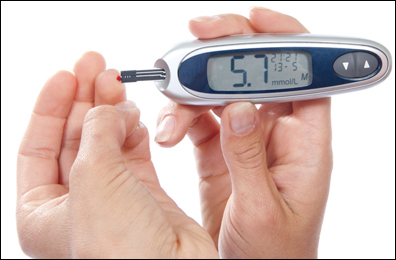Introduction
Vasopressin or antidiuretic hormone secreted by the pituitary gland is regulated for the handling of kidney by water. When a large quantity of water is taken the blood gets diluted. In response to the release of the antidiuretic hormone is inhibited. This results in more excretion of water in the urine. This process is known as diuresis.
Some times polyuria is encountered in pathological conditions like diabetes mellitus (madhumeha). Diuretics (drugs used for treating high blood pressure) cause increased urine flow.
Diabetes Mellitus (Madhumeha)

Diabetes Mellitus is a Metabolic Disorder Characterized by Two Features:
- Excess levels of glucose in the blood (hyperglycemia)
- Appearance of glucose in the urine (glycosuria)
Pancreas is a glandular organ having dual function of exocrine as well as endocrine. The endocrinal part of the pancreas consists of a group of cells known as islet of Langerhans. The islets contain α and ß cells, which secrete glucagon and insulin respectively. Diabetes mellitus may be encountered in obese as well as non obese patients.
Glucose consumed in the diet after absorption reaches the liver and insulin from the pancreas converts it into glycogen. If insulin is absent, glucose escapes in the blood circulation and the condition is known as hyperglycaemia. The normal value of blood glucose on an empty stomach is 80-120 mg/100 ml of blood (fasting) and after consuming meals 120-180 mg/100 ml of blood (postprandial).
Types of Diabetes Mellitus
Diabetes Mellitus is of Two Types:-
- Insulin-dependent diabetes mellitus (juvenile or type-1)
- Non-insulin dependent diabetes mellitus (maturity onset or type-2)
Clinical Features of Diabetes Mellitus
A Patient of Diabetes Mellitus may Present with:-
- Excess of thirst.
- Excess of appetite.
- Excess of urination.
- Weight gain or loss.
- Ulcers refuse to heal.
Complications of Diabetes Mellitus
If Diabetes is not Attended Properly, Complications can set in. These include:
- Effect on the nerves (diabetic neuropathy)
- Effect on the kidney (diabetic nephropathy)
- Effect on the eyes (diabetic retinopathy)
Ayurvedic Treatment of Diabetes Mellitus
- Gurmar-booti (Gymnema sylvestre) is described as the best herb for treating diabetes mellitus. Powdered leaves of the drug, one teaspoonful (5g), twice a day, is recommended for treating diabetes.
- Kulinjana or galangal (Alpinia gangalal) is highly effective in treating polyuria. Half of teaspoonful (2.5 g) of the powereded roots is given thrice a day with water. Tila or seasum is another herb helpful in this condition. Infusion is obtained by keeping fresh seasum in water for one night. Next morning the water is filtered and taken for at least seven days for onset of action. It should be continued for at least one month.
- Karvelaka or bitter gourd (Momordica charntia) is another plant worth mention in treating diabetes. Six teaspoonfuls (30 ml) of the juice of the leaves have beneficial effect in diabetes.
- Bejasara or kino (Pterocarpus marsupium) has been recently investigated for its anti-diabetic activity. One teaspoonful (5 g) of the powdered drug, twice days after meals are efficacious in treating diabetes mellitus.
- For obese diabetic patients, fenugreek (Trigonella foneum graceum) is ideal for reducing diabetic complications and elevated levels of blood lipids. One capsule thrice a day is recommended.
- Among polyherbal formulations, Nygorghadi quatha, six teaspoonfuls (30 ml), four times a day, is a favorite remedy for the treatment of polyuria.
- Among metallic formulations, Ayurveda recommends purified copper ash for treating diabetic complications particularity diabetic neuropathy. Tamra bhasma (ash prepared from copper), 125 mg twice a day after meals have good tonic effect in diabetic patients. Use of the formulation is contraindicated in patients having a history of kidney problem.
- Recently it has been postulated that diabetes is caused by free radicals. Antioxidants are gaining ground in treating diabetes mellitus and complications. Shilajeet is the best drug for this purpose. One capsule recommended as a supportive therapy in the treatment of diabetes.
Herbal Remedies for Diabetes
Planet Ayurveda offers best quality herbal remedies to maintain a healthy blood sugar level. All the products provided by Planet Ayurveda are prepared without the addition of chemicals in it and hence are safe to use. All of the herbal remedies from the house of Planet Ayurveda are 100 percent pure, natural and vegetarian.
Dosage
- Dia-Beta Plus – 2 capsules twice daily before meals with warm water.
- Karela Capsules – 2 capsules, twice daily after meals with warm water.
- Madhumehantak Churna – 1 teaspoonful twice daily with warm water, before meals.
- Fenugreek Capsules – 2 capsules, twice daily after meals with warm water.
- Diaplan Tea – 1 Cup of Diaplan Tea, Once Daily.
Products Description
1. Dia-Beta Plus
It is a very unique and effective herbal product for diabetes.It contains the best herbs for diabetes which improve the functional capacity of pancreas as well as controlling blood sugar levels naturally. This product has its roots in Ayurveda-ancient herbal healthcare.
2. Karela Capsules
Bittermelon is also known as Karela in Indian literature. Karela is quiet popular diabetes supplement in Asia for its role in diabetes. Bittermelon capsules are not only helpful in controlling sugar levels but also supplement essential chromium and other microminerals needed to restore the imbalance.
3. Madhumehantak Churna
It is a potent combination of rejuvenating herbs for diabetes used in Ayurveda since 5000 B.C. and its complications. These herbs act together in a synergistic manner and are effective in lowering the blood sugar levels naturally, without any side effects.
4. Fenugreek Capsules
Fenugreek (Trigonella foenum-graecum) is an aromatic herb in the family Fabaceae and is cultivated in India, Africa, Egypt, Morocco and England as a semi arid crop. It is used to treat a variety of health problems. The parts mainly used are the brownish seeds and sometimes fresh leaves are also used by Indians as a spice.
5. Diaplan Tea
Diaplan Tea is a herbal tea manufactured by Planet Ayurveda to help manage diabetes. A herbal tea made from a variety of plants, including Fenugreek (Trigonella foenum gracum), Cinnamon (Cinnamomum Zeylanicum), Tulsi (Ocimum sanctum) green tea (Camellia sinensis), and so on. Adernaline hormone inhibits insulin activity; this tea lowers Adernaline levels while increasing insulin function. It also reduces insulin resistance, which aids with blood sugar regulation.
To buy Diabetes Care Pack, please visit planetayurveda.com/products/diabetes-care-pack.
Extra Care in Diabetes
Patient suffering from diabetes are prone to opportunistic infections like sore throat, and fungal infections due to impaired immunity. Herbs rich in vitamin C like Indian gooseberry (Emblica officinalis) 500 mg twice a day or citrus fruits should be part of a diabetic diet.
Rationality in Treatment of Diabetes Mellitus
The treatment of diabetes mellitus requires a rational approach. The patient should take medicine regularly; blood tests should be performed regularly for adjusting the dose properly. Some drugs have a tendency to precipitate hypoglycaemia (low glucose levels in the blood). One thing must be kept in mind that there is no magic remedy that cuts diabetes from its root. Diet restrictions and moderate exercise have good impact on the quality of the life of the diabetic patient.
Do’s and Dont’s for Diabetes Mellitus
Old rice, wheat, old green grams, white grams, cow milk, cucumber, coriander, banana and ladyfinger are beneficial in diabetes mellitus. Smoking, bed rest, day sleeping, curd, oil, jaggery, pickles, figs, sugarcane, and sucrose are contraindicated. Soybean is best diabetic diet. It has been observed that in countries where Soybean is a regular part of the diet, the incidence of diabetes mellitus is less.

